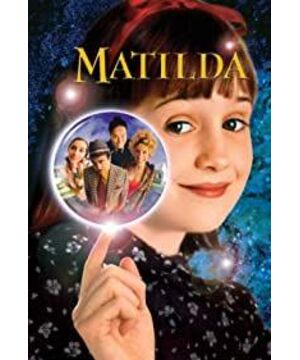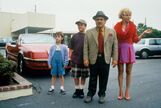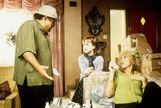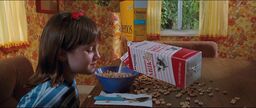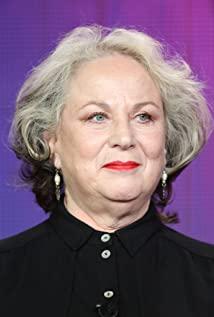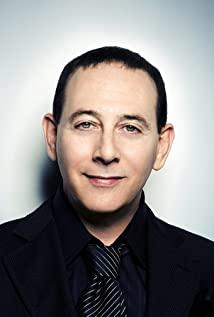The beginning of the film started with a little baby, and laid the foundation for two things, that is, the little girl reads a lot of books, has some extraordinary abilities, and is full of fantasy. The contrast between the young girl's age and knowledge, the contrast between one person and the three in the family, all set the stage for the following contradictions and conflicts. The rhythm of the narration is also very tight, without extra pen and ink.
The next expansion is mainly divided into two parts, home and school, "I'm right! You're wrong!" as a symbolic sentence appears in both parts. This passage conveys the kindness and justice of the little girl in a relaxed and funny atmosphere, and also depicts the new environment of the school, successfully shaping the girl's helper-the honey teacher and her enemy-the crazy principal.
I think the climax of the film is vague, or that the creators did not understand what is most exciting. In about an hour, the plot progressed to a "cat and mouse" chase between the little girl and the teacher Honey at the principal's house. The principal was holding a hammer ball in a hysterical and crazy manner that made the whole atmosphere tense, and the girl and the teacher both were escaping. The tacit interaction in both loves and adds some symmetrical beauty to the movie. This plot is not only suspenseful, but also expresses the theme through the principal's embarrassed posture and the two people's witty avoidance. When watching the movie, I think it should end here.
On the other hand, the real climax of the film is that after the girl discovers her superpowers, she pretends to be a ghost to punish the principal and take back the doll. The film took about 20 minutes to film how the principal was "fixed" by the girl from home to school. Although it was very pleasant, it also lost its original artistic value. Like Transformers War (do not deny that it is an excellent work), it makes people feel dull.
As for the two abilities that laid the groundwork at the beginning, there are also two points to watch. Due to the structural mistakes of the film, they are not well expressed. Girls' reading of the book is only reflected in her excellent performance in school, the attention of the honey teacher, and the lack of development, which makes people feel that she is going high and low. This reminds me of another movie "The Unfortunate Adventures of Ramonesnitch", which highlights the intellectual advantages of three children through various wonderful inventions, and truly achieves "IQ is also a kind of super ability." On the other hand, her ability to move objects with her mind was just a reminder and performance in the previous part. It was not until the last thirty minutes that she suddenly played a vital role. This is undoubtedly not in accordance with the law. Originally, the audience was looking forward to how the girl would defeat the principal and people's prejudice against children, but suddenly developed a super power. This kind of "descend to heaven" approach will make the audience feel disappointed and boring.
At the end of the film, the girl is adopted. Although the story is complete, it is a bit procrastinated. In fact, the creator does not need to pursue perfectionism in the content.
As for the various characters in the film, although they have successfully shaped their images, they are all slightly flat. For example, the principal is directly photographed as a dark force that needs to be defeated, and the honey teacher seems to exist only to help the girls. There are many There is a lack of explanation. For example, why is the girl’s family like this? Why are girls and brothers so different? Why does the principal hate children so much?
In general, I think this film could have a deeper social significance, but the creator made it into a pure fairy tale with happy ending.
View more about Matilda reviews


